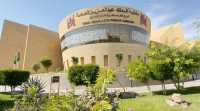
The Rare Quran Manuscripts Exhibition is an exhibition showcasing a collection of rare Quran manuscripts featuring various scripts, designs, and artistic styles. It was organized by the King Abdulaziz Public Library in 2022 in Riyadh , the capital of the Kingdom of Saudi Arabia. Contents of the Rare Quran Manuscripts Exhibition The King Abdulaziz Public Library possesses a collection of rare Quran manuscripts, most of which were written between the sixteenth and nineteenth centuries, totaling 2...
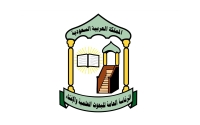
The General Presidency of Islamic Research and Ifta is entrusted by the government of the Kingdom of Saudi Arabia to issue Fatwas related to the personal affairs of government entities, the private sector, and individuals, in addition to conducting research in religious fields within the Kingdom. The presidency was established by a Royal Decree in 1954 under the name 'Dar al-Ifta and Supervision of Religious Affairs and Islamic Institutions,' which was later changed into the 'Gen...
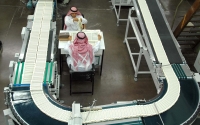
1982 The foundation stone for King Fahd Glorious Quran Printing Complex was laid to be a specialized institution for printing the Holy Quran and translating it into various languages and the entity responsible for various sciences related to the Quran, through the employment of more than one thousand specialized employees, including technicians, scholars, professors, and administrators. 1984 The Custodian of the Two Holy Mosques, King Fahd Bin Abdulaziz Al Saud, inaugurated King Fahd Glorious Q...
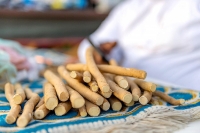
Siwak, also known as Miswak, is a stick used for cleaning the mouth and teeth, and it is one of the practices of natural disposition ( Sunan al-Fitrah ). Siwak is derived from the roots or stems of certain types of trees, including the Salvadora persica, a common shrub in the Kingdom of Saudi Arabia . It is also known as the toothbrush tree. Uses of Siwak Siwak is a natural tool for cleaning teeth and can be effectively used as a natural toothbrush to clean, freshen, protect, or maintain the or...
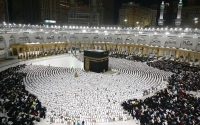
The requirements for becoming an imam at the Grand Mosque and the Prophet's Mosque , according to the regulatory guidelines for imams and muezzins in the Two Holy Mosques, are as follows: The candidate must be a Saudi national, hold a master's degree from one of the Shariah sciences colleges in the Kingdom of Saudi Arabia , have memorized the Quran with proficiency in its recitation, possess a good voice and performance, be fully capable of leading prayers, adhere to moderation follow...
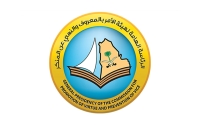
The General Presidency of the Commission for Promotion of Virtue and Prevention of Vice is the entity responsible for enjoining good and forbidding wrong, and to do so with patience and leniency in the Kingdom of Saudi Arabia. It is colloquially called the commission. The start of the General Presidency of the Commission for Promotion of Virtue and Prevention of Vice The General Presidency of the Commission for the Promotion of Virtue and the Prevention of Vice was officially recognized as an i...
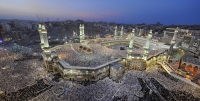
The expansions of the Two Holy Mosques by the Kings of the Kingdom of Saudi Arabia have been driven by both faith-based and practical motivations, starting from the era of the Founding King Abdulaziz Bin Abdulrahman Al Saud . These efforts combined the desire to enlarge the Grand Mosque and accommodate the increasing number of Muslims traveling to Makkah al-Mukarramah and al-Madinah al-Munawwarah each year. The motivations of the Kings of the Kingdom for expanding the Two Holy Mosques are refle...
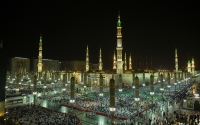
Islam is the final of the heavenly messages, sent by the Seal of the Prophets and Messengers, Muhammad, peace be upon him (PBUH), who called for the worship and oneness of Allah. Its sacred scripture is the Holy Quran. It is embraced by around two billion Muslims worldwide, known for adhering to its teachings and Sharia, and countries that base their legislation and laws on Islam are referred to as 'Islamic states'. The emergence of Islam The first emergence of Islam was in Makkah al-...
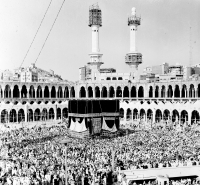
The Saudi expansion of the Two Holy Mosques encompasses increases in area, restorations, and construction and architecture work implemented in the Grand Mosque and the Prophet's Mosque during the Saudi era. The Saudi expansion of the Two Holy Mosques was related to the beginnings of the unification of the Kingdom of Saudi Arabia. The restoration of the Grand Mosque was the first work of the Founding King Abdulaziz Bin Abdulrahman Al Saud after he entered Makkah al-Mukarramah in 1924. The e...
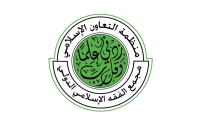
The International Islamic Fiqh Academy is an institution affiliated with the Organization of Islamic Conference (OIC), located in Jeddah Governorate, Makkah al-Mukarramah Province, Kingdom of Saudi Arabia. It was established following the resolution of the OIC's third conference held in Makkah al-Mukarramah in 1981, during the third session. The academy held its first session on November 19, 1984, which was an organizational and planning session for the academy's future work. Objectiv...
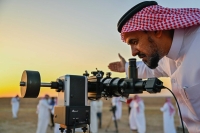
Tamir Observatory is one of the mobile observatories in the Kingdom of Saudi Arabia used for sighting the crescent moon of Hijri months. This practice has been conducted at the observatory since the 1920s. The observatory is located in the Tamir Center, in al-Majma'ah Governorate, in Riyadh Province. Among the well-known observers in Tamir are Ibrahim al-Barghash, followed by his son Abdulrahman, and then his grandson Mutaib. Tamir Astronomical Observatory Observers in Tamir used to sight ...
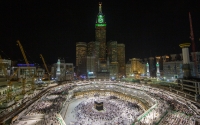
The Month of Ramadan falls on the ninth month of the Islamic calendar. It is seen by Muslims worldwide as a month of fasting, prayer, contemplation, and family reunions. The annual fasting of Ramadan is the fourth of the Five Pillars of Islam, and lasts for either twenty-nine or thirty days, starting from the sighting of the Ramadan crescent moon. The end of Ramadan is declared either at the sighting of Shawwal crescent or after completing thirty days of fasting if the moon's phases were n...